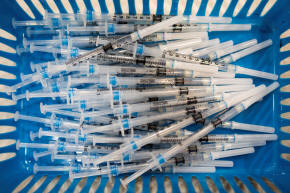U.S. FDA advisers recommend change to COVID vaccine composition for fall
 Send a link to a friend
Send a link to a friend
 [June 29, 2022]
By Michael Erman and Leroy Leo [June 29, 2022]
By Michael Erman and Leroy Leo
(Reuters) -Advisers to the U.S. Food and
Drug Administration on Tuesday recommended a change in the design of
COVID-19 booster shots this fall in order to combat more recently
circulating variants of the coronavirus.
The FDA's Vaccines and Related Biological Products Advisory Committee
voted 19-2 that the next wave of COVID booster shots should include a
component that targets the Omicron variant of the coronavirus.
The FDA plans to decide by early July on what the design of the boosters
should be.
FDA scientists at the meeting suggested they preferred vaccines that
will target the BA.4 and BA.5 Omicron subvariants that are currently
dominant rather than the BA.1 Omicron variant that led to a massive
surge in infections last winter.
Dr. Peter Marks, director of the FDA's Center for Biologics Evaluation
and Research, said the regulator would hope to launch a booster campaign
with a retooled vaccine by October.

"The better the match of the vaccines to the circulating strain we
believe may correspond to improved vaccine effectiveness, and
potentially to a better durability of protection," Marks told the
meeting of outside expert advisers to the agency.
Pfizer Inc, Moderna Inc and Novavax Inc presented data at the meeting.
All three companies have been testing versions of their vaccines updated
to combat the BA.1 Omicron variant.
Moderna said it would be ready with a "couple of hundred million" of
bivalent, or double targeted, vaccines designed to combat BA.1 by
September. It would be late October or early November if it needs to
design a vaccine targeting the newer subvariants, the company said.
Pfizer said that it and partner BioNTech already has a significant
amount of BA.1 vaccine ready and is preparing to produce a large amount
of vaccine targeting BA.4 and BA.5. It said either could be ready for an
early October rollout.
[to top of second column]
|

Doses of the Pfizer-BioNTech vaccine against the coronavirus disease
(COVID-19) are pictured at a booster clinic for 12 to 17-year-olds
in Lansdale, Pennsylvania, U.S., January 9, 2022. REUTERS/Hannah
Beier/File Photo
 Dr. Kanta Subbarao, representing a
World Health Organization advisory committee that also considered
the issue, said she preferred BA.1-based vaccines, suggesting they
could generate a broader immune response because that variant is
more distinct from the original virus than its successor subvariants.
"Our goal here is to achieve broader immunity against circulating
and emerging variants," Subbarao said, noting that trying to match
what variant might be circulating in the fall is difficult because
of uncertainty about the trajectory of the evolution of the virus.
Both Moderna and Pfizer have said that their respective BA.1
inclusive vaccines generated a better immune response against
Omicron than their current shots that were designed for the original
virus that emerged from China.
They have said their new vaccines also appear to work against BA.4
and BA.5, but that protection is not as strong as against BA.1.
The International Coalition of Medicines Regulatory Authorities, a
group of global drug regulators that includes the FDA, will meet to
discuss the issue on Thursday.
(Reporting by Michael Erman; Additional reporting by Julie
Steenhuysen in Chicago and Leroy Leo in Bengaluru; Editing by Bill
Berkrot)
[© 2022 Thomson Reuters. All rights
reserved.] This material may not be published,
broadcast, rewritten or redistributed.
Thompson Reuters is solely responsible for this content.
 |